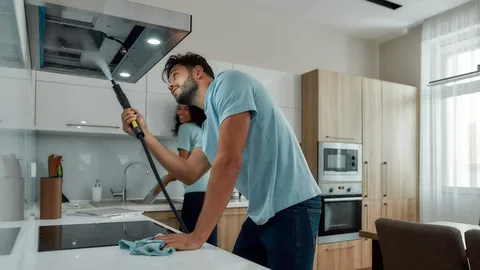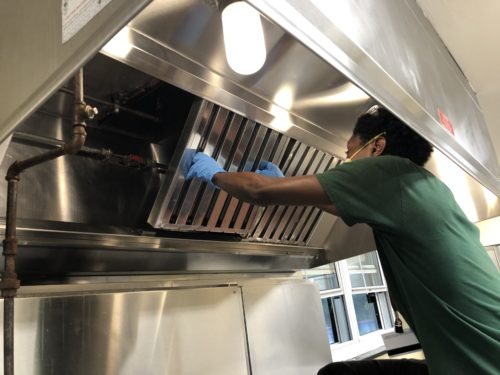How Often Should a Restaurant Clean Its Exhaust Hood?

Strong 8k brings an ultra-HD IPTV experience to your living room and your pocket.
Running a successful restaurant takes more than just great food and customer service. One of the most critical but often overlooked responsibilities is ensuring the kitchen remains safe and compliant. A key part of that responsibility involves routine exhaust hood system cleaning to prevent grease buildup, reduce fire hazards, and maintain proper ventilation.
Exhaust hoods help remove smoke, grease, heat, and odors from the kitchen environment. Over time, however, these systems accumulate grease and residue, creating serious fire hazards and reducing air quality. Regular cleaning is not only essential for fire prevention but also for meeting health code standards and extending the lifespan of your equipment.
Why Exhaust Hood Cleaning Matters in Commercial Kitchens
In commercial kitchens throughout North Charleston SC, the exhaust hood system serves as a key defense against airborne contaminants. It captures grease and smoke, improving ventilation and reducing fire risks. When buildup occurs, the system becomes less effective. That’s why many local restaurants trust SC SoftWash Pros for expert exhaust hood system cleaning.
Unclean exhaust hoods can lead to:
- Increased risk of kitchen fires
- Poor ventilation and air quality
- Non-compliance with local safety codes
- Health inspection violations
- Costly repairs or replacements
By scheduling routine commercial kitchen exhaust system cleaning, restaurants can avoid these risks while also improving operational efficiency and creating a safer working environment.
Industry Guidelines: How Often Should It Be Cleaned?
Cleaning frequency depends largely on the type and volume of cooking done. Different types of commercial kitchens will need different schedules. The National Fire Protection Association (NFPA) outlines cleaning intervals in their NFPA 96 standards, which most local fire codes follow.
Here’s a general breakdown:
- High-volume kitchens (e.g., fast food, 24/7 diners): Clean every 30 days
- Moderate-volume kitchens (e.g., casual restaurants): Clean every 90 days
- Low-volume kitchens (e.g., seasonal operations or low-use facilities): Clean every 6 months
- Kitchens using solid fuels (e.g., wood or charcoal): Clean monthly or even more frequently
Adhering to these schedules helps restaurants maintain a clean ventilation system and reduces the risk of grease fires or costly fines.
Factors That Affect Cleaning Frequency
Several variables can influence how often your exhaust hood needs cleaning:
- Type of food prepared: Greasy or fried foods result in faster grease buildup.
- Hours of operation: Longer cooking hours naturally increase residue.
- Volume of meals served: High customer turnover leads to more cooking, meaning more residue.
- Type of equipment used: Grills and fryers tend to produce more airborne grease than ovens or steamers.
It’s wise to consult with a professional hood cleaning service for a personalized cleaning schedule tailored to your kitchen’s specific needs. This ensures that no ductwork or fan motor is neglected during cleaning, which could compromise safety.
Fire Safety and Health Code Compliance
Failure to clean kitchen hoods properly is one of the top causes of commercial kitchen fires. In addition to that, many health inspectors closely examine the exhaust hood area for cleanliness and safety compliance. A neglected hood can quickly lead to citations or temporary closure, especially if grease drips are visible or the airflow is compromised.
Regular cleaning not only protects your staff and customers but also ensures your restaurant passes fire marshal and health inspections. Staying proactive with maintenance shows responsibility and professionalism—key elements in building trust with both customers and regulators.
Benefits of Routine Hood Cleaning
Cleaning your restaurant's exhaust system is more than a safety measure—it's a smart business move. Some of the core benefits include:
- Improved airflow and temperature control in the kitchen
- Longer equipment lifespan, reducing the need for frequent replacements
- Lower insurance premiums due to reduced fire risk
- Better employee comfort and fewer odor complaints
- Enhanced customer experience, especially in open kitchen setups
These outcomes not only make your kitchen safer but also contribute to smoother daily operations.
Professional Hood Cleaning Services Are Key
While some restaurant owners may attempt to clean filters themselves, complete hood system cleaning requires professional tools and certified technicians. From rooftop fans to grease traps and vertical ducts, every component needs thorough attention. Hiring trained professionals ensures compliance with local fire safety regulations and offers peace of mind.
When choosing a service provider, look for those familiar with:
- Kitchen exhaust system inspection reports
- NFPA 96 compliance documentation
- Pressure washing and chemical degreasing techniques
- Proper waste disposal methods
- Scheduling flexible to your off-hours or low-traffic times
Conclusion
Maintaining a regular exhaust hood cleaning schedule is not only essential for fire safety and code compliance—it’s a cornerstone of efficient restaurant operation. By understanding how often your kitchen needs cleaning and staying proactive, you can avoid costly damage, maintain cleaner air, and create a safer environment for everyone involved.
Investing in regular maintenance today protects your business tomorrow.
FAQs
1. How do I know when my restaurant’s exhaust hood needs cleaning?
Signs include visible grease buildup, poor ventilation, strong lingering odors, or dripping residue. If you’re unsure, a certified inspection can help determine the condition.
2. Can I clean the exhaust hood myself?
Basic filter cleaning can be done in-house, but a full system clean—including ducts and fans—requires professional equipment and should follow NFPA 96 standards.
3. What happens if I don’t clean my exhaust hood regularly?
Failure to clean regularly increases fire risks, can lead to fines during inspections, causes poor air quality, and may even void your insurance coverage.
4. Are there legal requirements for exhaust hood cleaning?
Yes. Most jurisdictions follow NFPA 96, which mandates cleaning intervals based on cooking volume and equipment. Always verify with your local fire marshal or building code authority.
5. What’s included in a professional hood cleaning service?
Services usually include degreasing filters, fans, ducts, and hood surfaces. Certified providers also offer inspection reports and can help meet regulatory documentation requirements.
Note: IndiBlogHub features both user-submitted and editorial content. We do not verify third-party contributions. Read our Disclaimer and Privacy Policyfor details.



